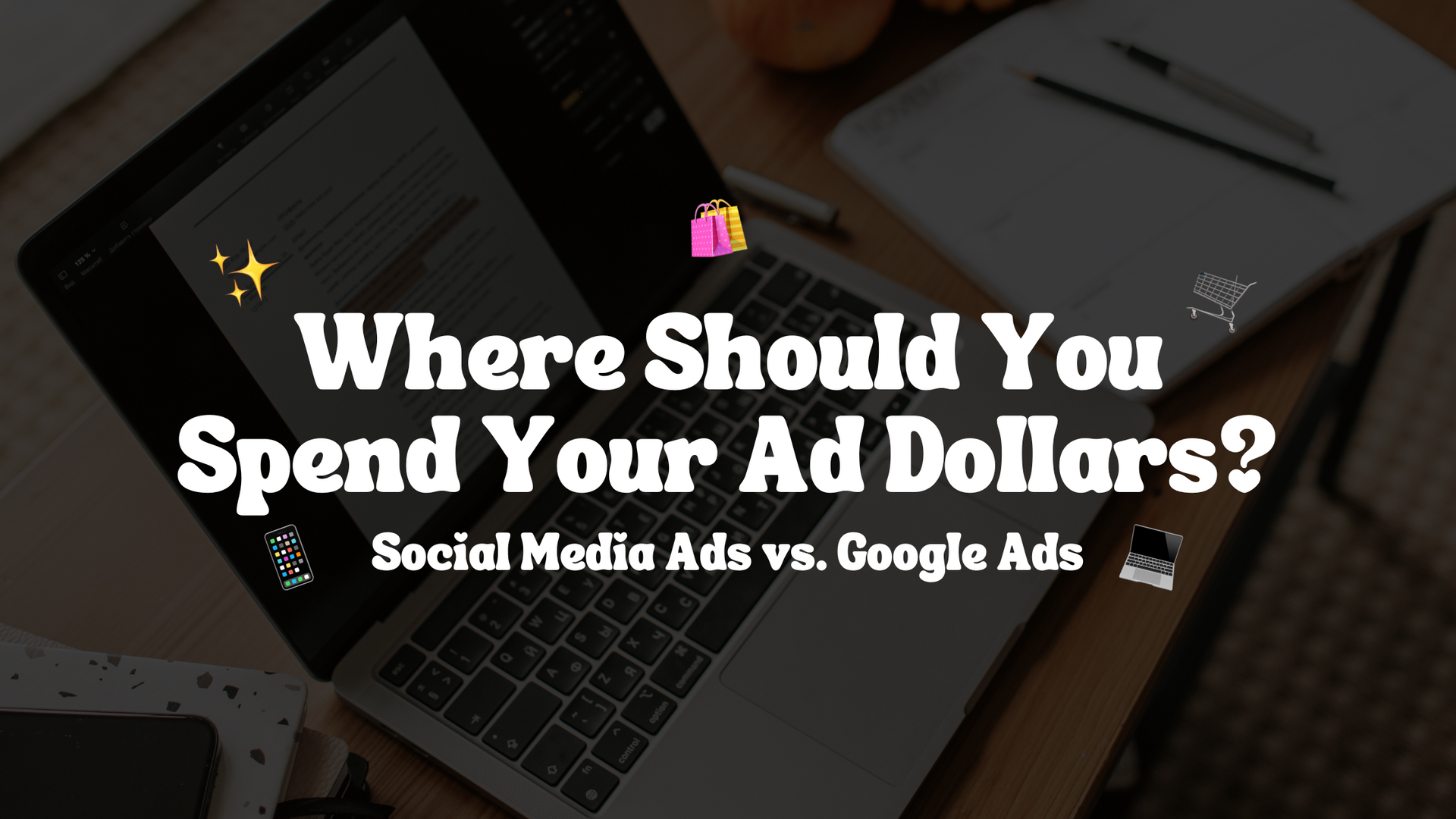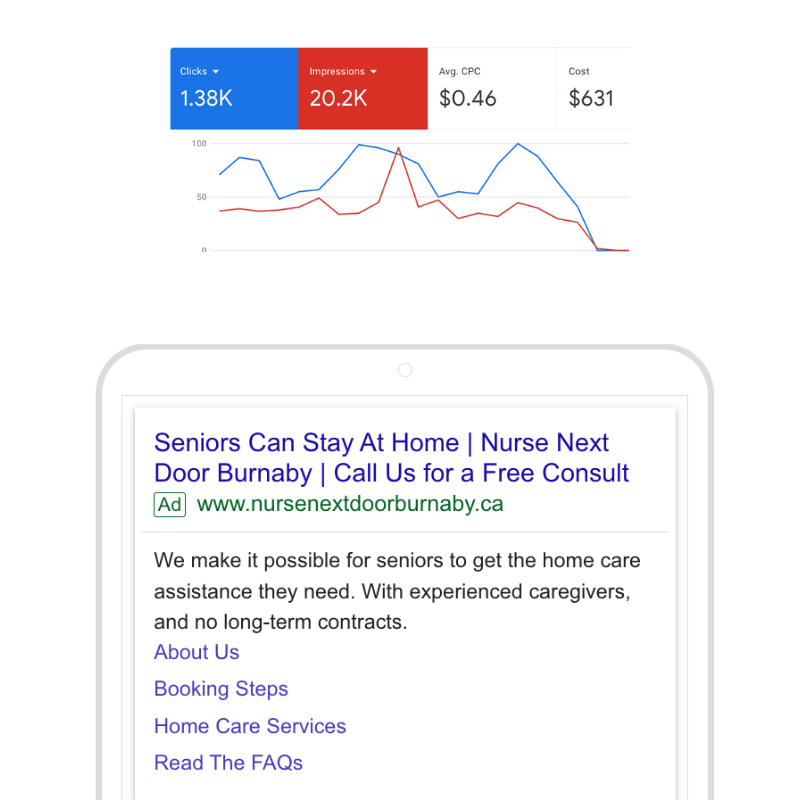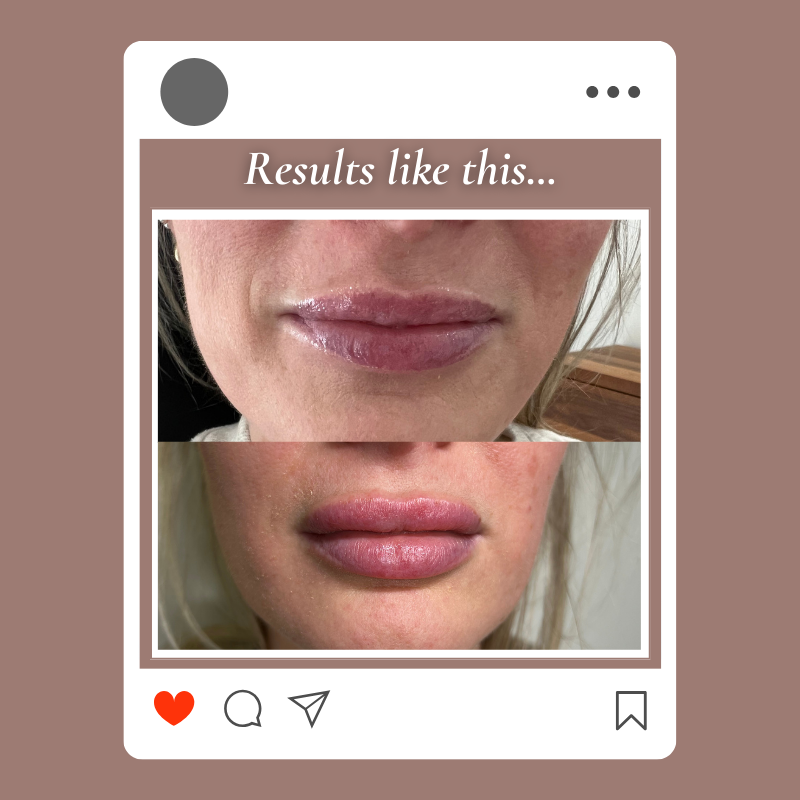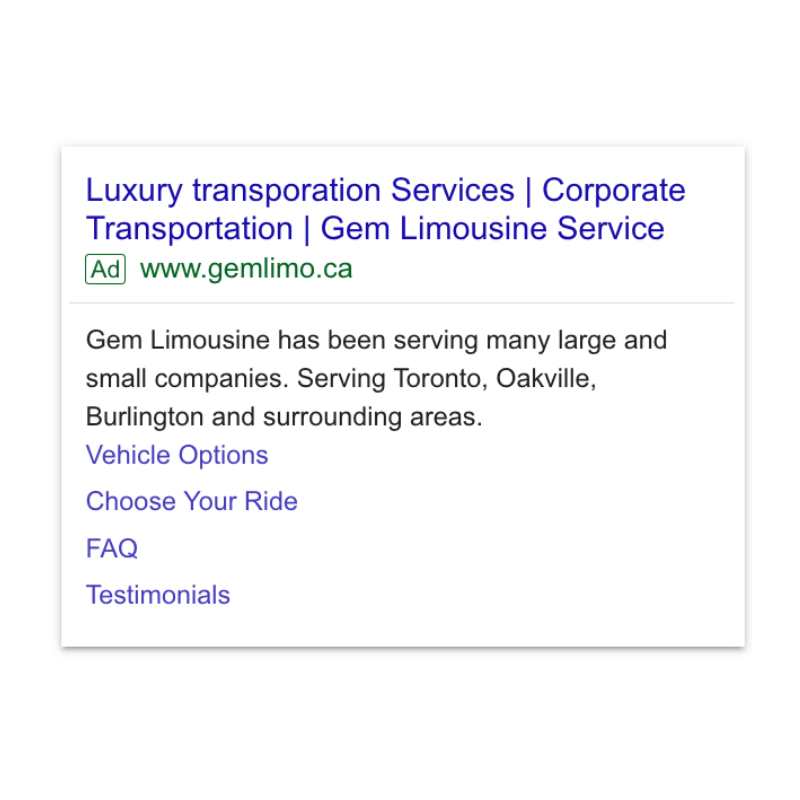Where Should You Spend Your Ad Dollars?

In digital marketing, organic campaigns can only do so much. They are great for establishing brand identity and consistency, and initial growth. However, organic campaign often plateau and don’t contribute to significant growth and momentum. This isn’t always the case, but many brands experience this issue. When you stop seeing the results you want organically, it’s time to implement an ad strategy.
Online advertising can be extremely beneficial for your business. It allows you to target your audience, utilize relevant keywords, and increase your visibility. The two main forms of online advertising we see are social media ads and Google Ads. Social media ads are launched on specific social media platforms, the most common of which is Meta ads (Facebook and Instagram). Other social media platforms like TikTok, Pinterest, LinkedIn, and X also have advertising capabilities built into them. Google Ads are run within Google and its affiliate sites.
While both social media ads and Google Ads can support the growth of your business, it’s important to know which type of ad is going to give you the best return on investment. A number of factors contribute to this. Keep reading to find out which avenue is best for your business.
Considerations for Choosing the Right Platform
There are a few key factors that contribute to whether you should advertise through social media or Google.
Google Advertising
Google Advertising relies on intent-based targeting. This means that the ad can only populate based on an active search query through Google channels. They would need to be looking for a specific service or product. You can bid on keywords that are relevant to your business, or could attract people to your content. For instance, a shoe retailer could bid on the keyword “Nike” in order for their ads to appear in a Google search for Nike. However, these can become costly.
There is also the consideration of location targeting. Are you advertising to individuals in the local community, or looking to attract traffic from a larger geographical area? Google advertising network displays are highly targeted toward a searcher’s location. There is a broad audience exposure for Google Ads, but the wider the geographical area, the more investment will be required for an effective ad campaign.
Google Ads are a great advertising tool when you are looking for lead generation. Because Google is directed toward people looking for a specific item or service, it’s not ideal for brand awareness. You can’t target based on demographics or a buyer persona the way you can with social ads.


Social Media Advertising
Social media advertising is a great tool to target potential consumers where they are already interacting every day. The average person spends more than 2 hours daily on social media. This provides a rich database for consumer information.
Social media advertising is more passive than Google Ads. You can target based on demographics, interests and behaviours. If you have a clear understanding of your target audience and can build out 3-5 buyer personas, running social media ads becomes simple. With the right visuals, social media ads become part of the overall social media user experience. They integrate into feeds and profiles to appear while people are scrolling. The messaging is more subtle and often doesn’t even feel like your audience is being advertised through.
When utilizing social media ads, you can achieve objectives including brand awareness, engagements, leads, clicks to the website, and more. Social media ads are highly effective for engagements and clicks, but are not the best tool for generating leads. It can be beneficial, but can also drive up the cost per result and use your budget faster.
The Pros and Cons
As with every tool, there are pros and cons. These are based on your goals, budget, and desired outcomes of the ad campaign.
Pros of Google Advertising
- Quickly generate leads or sales.
- Multiple options of advertising, including text-based ads, display ads, and YouTube ads.
- There are measurable results. Google offers strong metric reporting and integrates with Google Analytics, allowing businesses to track the performance of their campaigns accurately.
- Google Ads allows businesses to reach users who are actively searching for products or services related to their offerings.
- Flexible budget - if you’re working with a specific amount, there are things you can adjust within your targeting to make the most of your budget.
Cons of Google Advertising
- Google Advertising is highly competitive. With a large emphasis on location targeting, if all of your competitors in a given area are also advertising on Google, it drives up the cost of advertising.
- Technical expertise is needed for success - anyone can launch an ad but to see success and get results with proper tracking, you must be able to do some coding. Google Ads are more advanced and require some detailed knowledge of the platform in order to run seamless, successful ad campaigns.
Pros of Social Media Advertising
- Social media ads allow you to created targeted ads based on customer personas. You can target your ads to specific audiences based on a wide range of demographic and behavioural data.
- You can be creative with social media ads. There are many formats that can be used to launch effective social media ads, which make it part of the user experience. These include posts, stories, and reels.
- Social media ads are typically less expensive than Google Ads.
- Ads can be run simply for brand awareness, with potential to reach audiences in varying demographics based on targeting.
Cons of Social Media Advertising
- Social media ads may have lower sales intent since it can be a more passive experience. You can generate a lot of traffic or ad views, but not everyone may have the intent to purchase.
- Social media has a large user base, but not all may be your intended audience.
- There are multiple platforms to choose from. If you have a limited budget, or you don’t have a deep understanding of your customer base, it could be difficult to choose the best platform for your goals.
Ad Formats + Features
Both Google Ads and social media ads offer an array of ad formats which can be tailored to your objectives.
Google allows you to implement text ads, display ads, video ads, or app install ads. It’s important to know what your target audience wants and what type of ad will be most effective for them.
Social media ads focus on creative flexibility. You can leverage static images, videos, and carousels in your ad campaign. You also have the ability to do catalogue ads and much more.
On both platforms, you can and should test different ad creatives, targeting options, and strategies. It’s critical to understand your audience and adjust your ads according to monthly or quarterly data.

Tips from Our Ad Experts
On our team, we have ad experts who are immersed in the world of online advertising every day. They can launch effective ad campaigns that yield positive results for any type of business. Here are their best tips:
- Utilize local targeting options if your business or services are offered regionally
- Target long-tail keywords and variations your customer may be searching for
- Since Google Ads are concise, have a clear goal and objective
- Optimize your website landing pages for your Google ad groups
- Utilize all features of an ad, including writing strong descriptions and using ad extensions


Social Media
- Grab users' attention within the first 2 seconds of your ad
- Keep your ad design clean and on brand
- Continue creating fresh content
- Videos grab attention better than just an image ad
- Keep videos under 30 seconds
- Creative is better than heavily scripted
- Have a strong CTA linking to a strong page or shop
Looking for Support?
We know that jumping into the world of digital advertising can seem challenging. And it certainly can be. Anyone can launch an ad campaign, but in order to maximize your efforts, and your budget, it’s important to know how to seamlessly work within the platforms to get the results you’re looking for.
Our team of advertising experts are here to help you take your business to the next level. If you’re curious about launching a paid ads strategy, but you don’t know where to start, reach out to us at
hello@thesmallsocial.com. We would be happy to set up a discovery call to find out how we can support your business growth.





